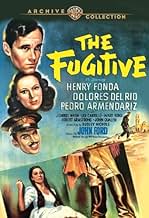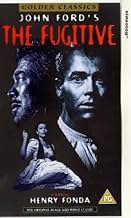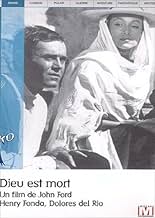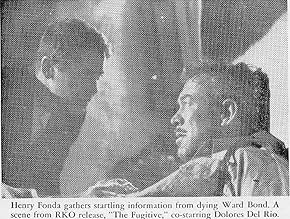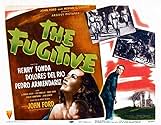IMDb RATING
6.3/10
2.8K
YOUR RATING
Anti-Catholic and anti-cleric policies in the Mexican state of Tabasco lead the revolutionary government to persecute the state's last remaining priest.Anti-Catholic and anti-cleric policies in the Mexican state of Tabasco lead the revolutionary government to persecute the state's last remaining priest.Anti-Catholic and anti-cleric policies in the Mexican state of Tabasco lead the revolutionary government to persecute the state's last remaining priest.
- Directors
- Writers
- Stars
- Awards
- 1 win & 2 nominations total
Dolores Del Río
- An Indian Woman
- (as Dolores Del Rio)
Pedro Armendáriz
- A Lieutenant of Police
- (as Pedro Armendariz)
Chris-Pin Martin
- An Organ-Grinder
- (as Cris-Pin Martin)
Miguel Inclán
- A Hostage
- (as Miguel Inclan)
Fernando Fernández
- A Singer
- (as Fernando Fernandez)
Rodolfo Acosta
- Policeman
- (uncredited)
Mel Ferrer
- Father Serra
- (uncredited)
Jack Pennick
- Man
- (uncredited)
José Torvay
- Mexican
- (uncredited)
- Directors
- Writers
- All cast & crew
- Production, box office & more at IMDbPro
Featured reviews
When Herbert J. Yates of Republic Pictures made a deal with John Ford to produce The Quiet Man he first made Ford agree to do one of his cavalry epics with John Wayne because he wanted a surefire moneymaker before taking a chance on The Quiet Man. The cavalry picture was Rio Grande.
He must have been talking to the folks at RKO who lost their collective shirts when the public stayed away in droves from The Fugitive. It got great critical acclaim and no box office at all.
My guess is that The Fugitive was sold all wrong or was made a year or two too early. If it had been sold as an anti-Communist as opposed to a pro-Catholic film it might have done better in those beginning years of The Cold War.
The Fugitive is based on a Graham Greene novel The Power and the Glory and it is about a priest in an unnamed South American country who is a fugitive because of his calling. An anti-clerical government has taken control of the country and they are doing their best to drive the Catholic religion out of the country.
Henry Fonda turns in a good sincere performance as the cleric, but he's about as convincingly Latino as Toshiro Mifune. The other members of the cast are well suited for their roles.
The best performance in the film is from that chameleon like actor J. Carrol Naish who could play any kind of nationality on the planet. He's the informer who rats out Henry Fonda to the police. Very similar to what Akim Tamiroff did to Gary Cooper in For Whom The Bells Toll and Naish's own performance in another Gary Cooper film, Beau Geste.
This was the first of three films Pedro Armendariz did with John Ford in an effort to broaden his appeal beyond Mexican cinema. Dolores Del Rio as his estranged wife was already familiar to American audiences from the silent screen.
The original novel by Greene had the priest as somewhat less than true to all his vows. He's a drinker and a womanizer. Del Rio's character is also quite tawdry. And this from Greene who was a well known Catholic lay person. But this Hollywood in the firm grip of The Code so a lot of what Greene wrote had to be softened by Ford for the screen. It lessened the impact of the film.
And with the whitewashing of Fonda's character came some rather heavy handed symbolism of Fonda as a Christlike figure.
Still The Fugitive might be worth a look for Ford, Greene, and Fonda fans.
He must have been talking to the folks at RKO who lost their collective shirts when the public stayed away in droves from The Fugitive. It got great critical acclaim and no box office at all.
My guess is that The Fugitive was sold all wrong or was made a year or two too early. If it had been sold as an anti-Communist as opposed to a pro-Catholic film it might have done better in those beginning years of The Cold War.
The Fugitive is based on a Graham Greene novel The Power and the Glory and it is about a priest in an unnamed South American country who is a fugitive because of his calling. An anti-clerical government has taken control of the country and they are doing their best to drive the Catholic religion out of the country.
Henry Fonda turns in a good sincere performance as the cleric, but he's about as convincingly Latino as Toshiro Mifune. The other members of the cast are well suited for their roles.
The best performance in the film is from that chameleon like actor J. Carrol Naish who could play any kind of nationality on the planet. He's the informer who rats out Henry Fonda to the police. Very similar to what Akim Tamiroff did to Gary Cooper in For Whom The Bells Toll and Naish's own performance in another Gary Cooper film, Beau Geste.
This was the first of three films Pedro Armendariz did with John Ford in an effort to broaden his appeal beyond Mexican cinema. Dolores Del Rio as his estranged wife was already familiar to American audiences from the silent screen.
The original novel by Greene had the priest as somewhat less than true to all his vows. He's a drinker and a womanizer. Del Rio's character is also quite tawdry. And this from Greene who was a well known Catholic lay person. But this Hollywood in the firm grip of The Code so a lot of what Greene wrote had to be softened by Ford for the screen. It lessened the impact of the film.
And with the whitewashing of Fonda's character came some rather heavy handed symbolism of Fonda as a Christlike figure.
Still The Fugitive might be worth a look for Ford, Greene, and Fonda fans.
Graham Greene is one of the literary greats, and while the book 'The Power and the Glory' that 1947's 'The Fugitive' is based on is not one of my favourites of his and one can totally see why it was controversial at the time it is an interesting read. John Ford was a truly fine director, one of the best at that time, known for some of the finest Westerns around and he excelled too in non-Westerns (i.e. 'The Quiet Man'). The cast is an interesting one, Henry Fonda being the best known.
'The Fugitive' adaptation-wise is a loose one, and the censorship the film had to endure dilutes the impact somewhat. Two of the biggest differences being Fonda's character being no longer being an alcoholic and the central relationship not being sexual, which if included would have the film quite bold. If included though, it would have made it as divisive as the book. On its own terms, 'The Fugitive' didn't wow me and the potential was there for it to have been a much better film. But it was still not bad at all, actually thought that it was quite good, and there are a fair share of note-worthy good elements.
Coming off best of the many good things is Gabriel Figueroa's outdoor photography. Which is really quite miraculous, so many of the shots leave one in wonder in their beauty and varied technical skill. Oh and the outdoor locations are just stunning. The haunting score doesn't feel too constant or in your face, having the right mood throughout while not over-emphasising too much. Ford does show frequently how great he was as a director, at its best his direction here in 'The Fugitive' is quite masterly.
Some very thoughtful and powerful moments in the script and enough of the story compels and moves. The performances are very good, with a smouldering Dolores Del Rio (though she does have moments where she overacts) and a remarkably nuanced Fonda in a complex role being generally strong. The best performance comes from a both menacing and tortured Pedro Armendariz, who is riveting whenever he appears.
On the other hand, too much of the writing is very melodramatic to an over-cooked degree, as is Del Rio at times. Some of the pace is a bit draggy.
Do agree with those that say that the religious element of the story is very heavy-handed and at times vague. It is focused on too much and it is delivered with little subtlety, the messaging was done in a way that made me feel beaten around the head.
All in all, a lot of note-worthy things but flawed. One of those "appreciated what it tried to do" sort of films while not properly loving it, the divisiveness in opinions is understandable. 6.5/10
'The Fugitive' adaptation-wise is a loose one, and the censorship the film had to endure dilutes the impact somewhat. Two of the biggest differences being Fonda's character being no longer being an alcoholic and the central relationship not being sexual, which if included would have the film quite bold. If included though, it would have made it as divisive as the book. On its own terms, 'The Fugitive' didn't wow me and the potential was there for it to have been a much better film. But it was still not bad at all, actually thought that it was quite good, and there are a fair share of note-worthy good elements.
Coming off best of the many good things is Gabriel Figueroa's outdoor photography. Which is really quite miraculous, so many of the shots leave one in wonder in their beauty and varied technical skill. Oh and the outdoor locations are just stunning. The haunting score doesn't feel too constant or in your face, having the right mood throughout while not over-emphasising too much. Ford does show frequently how great he was as a director, at its best his direction here in 'The Fugitive' is quite masterly.
Some very thoughtful and powerful moments in the script and enough of the story compels and moves. The performances are very good, with a smouldering Dolores Del Rio (though she does have moments where she overacts) and a remarkably nuanced Fonda in a complex role being generally strong. The best performance comes from a both menacing and tortured Pedro Armendariz, who is riveting whenever he appears.
On the other hand, too much of the writing is very melodramatic to an over-cooked degree, as is Del Rio at times. Some of the pace is a bit draggy.
Do agree with those that say that the religious element of the story is very heavy-handed and at times vague. It is focused on too much and it is delivered with little subtlety, the messaging was done in a way that made me feel beaten around the head.
All in all, a lot of note-worthy things but flawed. One of those "appreciated what it tried to do" sort of films while not properly loving it, the divisiveness in opinions is understandable. 6.5/10
It's been written somewhere that the cruelest thing you can say to an artist is that his work is flawless. John Ford thought of the Fugitive as, despite not being a box-office success, a perfect film and one of his very favorites. It's perhaps more than prudent then to point out some of the criticisms one would have of the film (which, perhaps, is moot since he's been dead for decades). As a fan of the Ford work I've seen there are some times when he's touched perfection (Grapes of Wrath and the Searchers are it for me), and sometimes not so much, which goes without saying he directed many films. With the Fugitive it's recognizable to me why it's split its audience: some hail it as being totally underrated and a brilliant depiction of religious allegory and suffering, and some say that it's a total crock for being far too heavy-handed and acted over-the-top.
Both sides have their right points; it is an underrated picture, if only for its technical feats of cinematography (Gabriel Figueroa is just right for this kind of material for Ford) and Ford's usual talents as a basic storyteller with a tendency for pure cinema expression (i.e. lack of dialog is a plus with the emotion expressed through the camera and actors. But it is also not well-acted in a couple of instances, notably the beautiful but overbearing Delores Del-Rio as the woman living in the town who's baby is baptized by the Priest played by Henry Fonda. For Fonda, it should be said, he at least gives all he can for a performance that possibly other actors could have played with more magnificence. In fact it's for him that some of the picture is most watchable, as he flexes his emotional chops for a scene where it's required for complexity like when he misses the boat and is asked to bless someone dying only to realize there is no wine and must go to ask from a vulgarian for wine (which, as it turns out, is drunken with brandy and all by him).
While it might not be the Fonda we all know and love from Grapes of Wrath or My Darling Clementine he does what he can with the part, and it's a tribute to him and Ford that they make it engrossing on a very simple level that carries some complex connotations. When focusing on the actual chase and flight from the Mexican police it works very well (particularly with a hammy but effective informer played by J. Carrol Nash). It's just when Ford over-indulges in the spiritual aspect of the picture, which is only made clearer towards the end, that it loses its footing. Indeed the start of the picture kind of threw me off for a little bit as Fonda comes in with the Christ-like symbolism highlighted on the wall, and the townspeople come in with tears in their eyes and a somber song to sing and Fonda blesses and baptizes others. I wondered: is this a little TOO much in the way of what Ford does best, which is telling the story? He can be brilliant in throwing in his deep-rooted Catholic ideas as pure visions on the screen, and once or twice in the Fugitive he does... and then other times it falls flat or goes too high where it starts to become a full-blown religious picture as opposed to a societal thriller.
Should Ford fans see it? Of course; even a lessor Ford picture will have something interesting. Will everyone like it? Surely not. Yet it is usually fine, traditional work and shouldn't be completely dismissed.
Both sides have their right points; it is an underrated picture, if only for its technical feats of cinematography (Gabriel Figueroa is just right for this kind of material for Ford) and Ford's usual talents as a basic storyteller with a tendency for pure cinema expression (i.e. lack of dialog is a plus with the emotion expressed through the camera and actors. But it is also not well-acted in a couple of instances, notably the beautiful but overbearing Delores Del-Rio as the woman living in the town who's baby is baptized by the Priest played by Henry Fonda. For Fonda, it should be said, he at least gives all he can for a performance that possibly other actors could have played with more magnificence. In fact it's for him that some of the picture is most watchable, as he flexes his emotional chops for a scene where it's required for complexity like when he misses the boat and is asked to bless someone dying only to realize there is no wine and must go to ask from a vulgarian for wine (which, as it turns out, is drunken with brandy and all by him).
While it might not be the Fonda we all know and love from Grapes of Wrath or My Darling Clementine he does what he can with the part, and it's a tribute to him and Ford that they make it engrossing on a very simple level that carries some complex connotations. When focusing on the actual chase and flight from the Mexican police it works very well (particularly with a hammy but effective informer played by J. Carrol Nash). It's just when Ford over-indulges in the spiritual aspect of the picture, which is only made clearer towards the end, that it loses its footing. Indeed the start of the picture kind of threw me off for a little bit as Fonda comes in with the Christ-like symbolism highlighted on the wall, and the townspeople come in with tears in their eyes and a somber song to sing and Fonda blesses and baptizes others. I wondered: is this a little TOO much in the way of what Ford does best, which is telling the story? He can be brilliant in throwing in his deep-rooted Catholic ideas as pure visions on the screen, and once or twice in the Fugitive he does... and then other times it falls flat or goes too high where it starts to become a full-blown religious picture as opposed to a societal thriller.
Should Ford fans see it? Of course; even a lessor Ford picture will have something interesting. Will everyone like it? Surely not. Yet it is usually fine, traditional work and shouldn't be completely dismissed.
This excellent and dramatic movie , a co-production US-Mexico , is based on Graham Greene novel and written by Dudley Nichols . It starts when a priest (Henry Fonda) attempting to flee from a Centroamerican country , because Christianity being pursued by a totalitarian govern . He encounters help by an Indian woman (Dolores Del Rio) with a baby . She gives him direction to port where he could embark towards freedom . Meanwhile , he finds a mean countryman (J Carrol Naish) craving reward and is pursued by an authoritarian officer (Pedro Armendariz). Furthermore , his existence runs parallel a bank robber , The Gringo (War Bond) also relentlessly pursued .
Magnificent movie featuring awesome performances by complete casting . The film develops some John Ford's usual themes , as the sentimental nostalgia , sense of camaraderie , religion , and abound touching scenes . Henry Fonda in a larger-than-life role as a good priest is top-notch , Pedro Armendariz as a nasty general is perfect and War Bond as outlaw wanted by totalitarian police is cool . Fonda (Grapes of wrath , Drums along the Mohawk , Young Mr. Lincoln) and Pedro Armendariz (3 Godfathers , Fort Apache) played several films for John Ford . Besides , there appears Ford's habitual friends , someone uncredited , such as Jack Pennick , Rodolfo Acosta , John Qualen , Fortunio Bonanova , J Carrol Naish, Mel Ferrer's first film and the opening narration is by Ward Bond , who also plays an important role in the film . Luxurious cinematography in lights and darks by Gabriel Figueroa (usual of director Emilio Fernandez , here also producer) . Enjoyable musical score by Richard Hageman , adding Mexican songs with emotive dance included in charge of Dolores Del Rio . The picture shot in Mexico , was produced by Ford's Argosy Production Company , RKO pictures and Merian C. Cooper . Rating : Better than average , well worth seeing for John Ford enthusiasts .
Magnificent movie featuring awesome performances by complete casting . The film develops some John Ford's usual themes , as the sentimental nostalgia , sense of camaraderie , religion , and abound touching scenes . Henry Fonda in a larger-than-life role as a good priest is top-notch , Pedro Armendariz as a nasty general is perfect and War Bond as outlaw wanted by totalitarian police is cool . Fonda (Grapes of wrath , Drums along the Mohawk , Young Mr. Lincoln) and Pedro Armendariz (3 Godfathers , Fort Apache) played several films for John Ford . Besides , there appears Ford's habitual friends , someone uncredited , such as Jack Pennick , Rodolfo Acosta , John Qualen , Fortunio Bonanova , J Carrol Naish, Mel Ferrer's first film and the opening narration is by Ward Bond , who also plays an important role in the film . Luxurious cinematography in lights and darks by Gabriel Figueroa (usual of director Emilio Fernandez , here also producer) . Enjoyable musical score by Richard Hageman , adding Mexican songs with emotive dance included in charge of Dolores Del Rio . The picture shot in Mexico , was produced by Ford's Argosy Production Company , RKO pictures and Merian C. Cooper . Rating : Better than average , well worth seeing for John Ford enthusiasts .
I was attracted to this movie because of Henry Fonday, Dolores del Rio, and John Ford, all of whom I'm a fan. But this movie was just so WEIRD. From the start, I felt like I had joined the movie in the middle. The dramatic music along the walk and as he enters the church - it feels like a crucial point in a movie, but we don't even know what's going on yet. There are long periods with no dialogue, almost has the feel of a silent movie at times.
I found the whole movie depressing without any redeeming character development that would have made me sympathize with the characters. Why is Fonda, a white priest, even in this country in the first place? It's never explained. And he lets everyone take the fall for him. He's not likable or relatable in any way to me.
I found the whole movie depressing without any redeeming character development that would have made me sympathize with the characters. Why is Fonda, a white priest, even in this country in the first place? It's never explained. And he lets everyone take the fall for him. He's not likable or relatable in any way to me.
Did you know
- TriviaThe release of John Ford's first Mexican film caused controversy in Mexico, because the film brought back unwelcome memories of Mexico's dark hours under the anti-clerical rule of President Plutarco Calles during the late 1920s. Calles's attempt to suppress the influence of the Catholic Church on people's lives sparked the Cristero Rebellion (1926-1929) that took place largely in northern and central Mexico.
- GoofsWhen the Priest is on line getting ready to board a ship, he is approached by a young boy that was baptized by him. The boy informs him that his mother is dying and wishes for the priest to come home with him to give her the last rites. What is not explained is how did the boy just happen to know that the priest was in town and getting ready to board a ship at that precise moment and in the third class section.
- Quotes
A Lieutenant of Police: [Looking at news clipping] You can tell he's a priest by the collar, that's all.
A Chief of Police: Not a very good picture, but it's what we got.
A Lieutenant of Police: They all look alike to me. I've shot him a dozen times.
- ConnectionsFeatured in John Ford (1992)
- SoundtracksBury Me Not on the Lone Prairie
("The Dying Cowboy") (uncredited)
American folk ballad based on an older sea song (1932)
Variation heard as theme for the Gringo (Ward Bond)
- How long is The Fugitive?Powered by Alexa
Details
Box office
- Budget
- $1,500,000 (estimated)
- Runtime
- 1h 44m(104 min)
- Color
- Aspect ratio
- 1.37 : 1
Contribute to this page
Suggest an edit or add missing content

